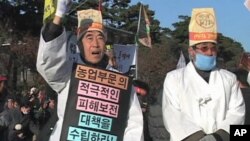North Korea has experienced chronic food shortages for about two decades, mainly due to the government's political isolation and mismanagement. Belts in the North have tightened even further since South Korea's president stopped sending large amounts of rice. Now, South Korean farmers say there is too much rice on the market here, and they find they have a vested interest in rekindling generosity toward the North.
Demonstrations like this one, just a few hundred meters from South Korea's parliament in Seoul, are frequent.
The livelihood of South Korean rice farmers is one of the country's most sensitive political topics. The government subsidizes rice production and shields the market from most imports. Still, farmers make impassioned pleas, and sometimes take drastic action, to demand even more aid.
These days, politics add a new twist to the usual drama.
"We have been crying at the top of our voices, start sending rice to North Korea again! We should try to consume more rice here at home, but if we can't consume it all, then we must resume North Korean rice aid," said Democratic Party chairman Chung Sye Kyun.
For most of the past 10 years, South Korea annually shipped nearly half a million tons of rice to impoverished North Korea.
That ended last year, when President Lee Myung-bak adopted a harder policy toward Pyongyang, saying significant aid could only take place if North Korea took real steps to end its nuclear weapons programs.
The problem is the rice shipped north effectively subsidized South Korean farmers; it was taken off the market, shoring up prices, so farmers earned more.
Kim Jin-beum, chairman of the Korean Alliance of Farmers, says now South Korea has too much rice, and prices are down.
"For these two years of the Lee administration, we've piled up two-thirds of a million tons of surplus rice, and we have no way to store it properly," he said. "So that is why if we can't send it to North Korea, then at least we should send it to poor countries, so there will be room to store this year's new harvest."
The problem is compounded by changing tastes among South Koreans, who increasingly eat pasta, pizza and sandwiches, instead of the traditional bowl of rice.
It all means that future protests are likely to continue to bang the drum for more rice aid to North Korea.
News
North Korea Finds Latest Ally: South Korean Rice Farmers
update
- By Kurt Achin

North Korea has experienced chronic food shortages for about two decades, mainly due to the government's political isolation and mismanagement. Belts in the North have tightened even further since South Korea's president stopped sending large amounts of rice.










